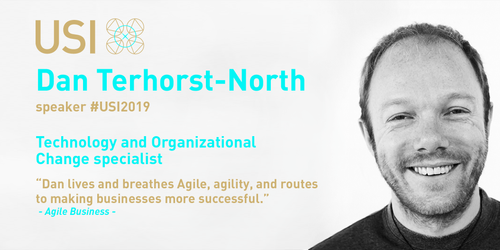Interview Dan Terhorst-North : "Genuine business agility starts from the top, with leaders showing by doing"
As an agile coach, coder and consultant for over 25 years now, Dan Terhorst-North knows his way around complexity. Especially when it comes to helping organizations taming it (isn't that what agility is all about?).
As a teaser for Dan's speech at USI 2019, we asked him about his various adventures with agile, his inspirations and beliefs for the future of work.
What are your latest subjects of interest?
I am fascinated by the many ways an organisation can adapt to become more effective, through leadership, strategy, process, technology, community, or other ways. I am working with different organisations looking at various aspects of these, and I love uncovering the ways they interact with each other.
You published an inspiring blog post in January 2018 about SWARMing. A year and half later, what are your observations and conclusions on the matter?
I’m not sure I have any conclusions! It is an ongoing journey of discovery. I was delighted by the positive feedback from the article, and engaging with some of the many people out there using similar values-based approaches to business agility rather than subscribing to a Big Methodology.
In your opinion what are the most valuable qualities in a coach? And the worst flaws…?
First it is worth defining what we mean by coaching. There are various different types of helping which have different names, and people often mix them up.
- Coaching is about helping someone define and reach objectives. It is about starting where they are and “co-creating” a path forwards. A coach doesn’t need to have any domain knowledge: you can coach a software team without being a programmer. One description I like is “The coach is an expert in asking questions. You are the expert in being you.”
- Mentoring is where you help someone to grow by sharing your experience with them, so you could mentor a less experienced manager, or programmer, or tennis player, or anyone else where you are further on your journey and they can benefit from your experience. This assumes a wealth of specialist knowledge.
- Counselling is about helping someone understand themselves. Coaching and mentoring are inherently forward-looking. Counselling involves looking at how they got to where they are. This area typically involves specialist medical training and qualification.
Most people talking about coaching really mean mentoring, especially in an agile transformation sense. They don’t just want help with goals and actions, they want to lean on your experience and insight from doing this elsewhere. Because of this confused vocabulary (what does a sports “coach” do in any case?) people can have unrealistic expectations of a coach. So given this, in my experience the most valuable quality of a coach is empathy, followed by patience and the ability to listen. I struggle with at least two of these! A coach who cannot meet their client where they are is going to find it difficult to engage with them or be taken seriously.
There are many flaws a coach can have but among the worst are having “one true way” that you enforce (inflict?) in every situation. This ideological coaching means you are pushing your own agenda rather than helping the client achieve theirs.
A coach who cannot meet their client where they are is going to find it difficult to engage with them or be taken seriously.
Meet Dan Terhorst-North at USI 2019
What is key to get the best of people when transforming an organisation? Any experiences to share?
Start with people who want to be there! Start small and build momentum. Too often people try to “go agile” by buying in a big transformation from a consultancy and trying to flip the organisation in one go. This is doomed to fail every time. Instead take the time to make the early adopters successful, and then amplify their stories within the organisation. People respond to narratives, and they respond to seeing their peers being successful. This kind of authentic, empathic engagement is the only way I have found to successfully bring people with you.
People respond to narratives, and they respond to seeing their peers being successful.
As we look around us, we can see companies adopting agile principles more and more widely. Do you feel like we’ve reached the end of an era in agile? What are the new challenges ahead?
I wish that were true! Companies are adopting agile vocabulary. They are using the terminology but under the thin veneer of Product Owners, Backlogs and Product Increments are the same old structures of authority and control. As long as the funding and the governance remain unchallenged any pretence at agility will just be another passing fad. Genuine business agility starts from the top, with leaders showing by doing, and requires a complete overhaul of organisational norms. Certification and consultancy are easy things to procure, but they lead to a simplistic approach to a complex problem.
As long as the funding and the governance remain unchallenged any pretence at agility will just be another passing fad
There are some fantastic case studies of organisations that really took the time to tackle the hard problems, although many of them are unwilling or unable to talk about them, and I am optimistic for the future of work. Of course there is the Darwinian element that the organisations who aren’t embracing this thinking simply won’t exist in 10 or 15 years, but I would prefer to see them embrace the challenge than collapse under it.
Read our interview with agile expert Henrik Kniberg: "Agile is about taming complexity"
